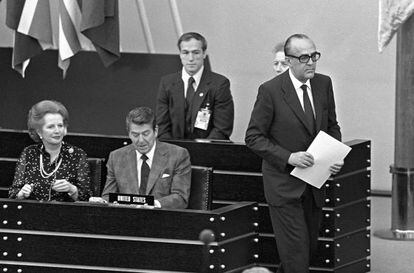Cabinet papers reveal Thatcher feared Spanish attack on Gibraltar
Argentina’s Falklands invasion in 1982 led to British PM arming The Rock

The Spanish media's support for Argentina's invasion of the Falkland Islands in April 1982 raised British Prime Minister Margaret Thatcher's fears that rogue elements within the Spanish military might try to seize Gibraltar, prompting her to beef up Britain's military presence on The Rock, newly released Cabinet papers reveal.
On April 7, five days after Argentina's ruling military junta seized the British dependency in the South Atlantic, Thatcher called for an "urgent assessment" of Britain's ability to defend Gibraltar, prompted in part by the "jubilant reaction" to the invasion in the Spanish press.
A joint Foreign and Commonwealth Office (FCO) and Ministry of Defence report on the situation sought to reassure the prime minister. But Thatcher's concerns are shown in a handwritten document: "This is suspiciously like the Falkland Islands assessment before invasion. 1,000 soldiers with a land boundary, no air cover etc. "Gibraltar was to play a crucial role in supporting the Navy task force sent to recover the Falkland Islands.Military chiefs found no evidence of an increased threat but could not rule out the possibility that "extremist right wing elements" within the Spanish military might attempt to "demonstrate patriotism by some provocation." Just a year earlier, military plotters had staged a bungled coup.
"Given the small size of the territory, British forces in place are in a good position to make an armed assault a militarily hazardous undertaking," they wrote, adding: "Although the territory could no doubt eventually be overwhelmed by vastly superior forces, the defenders could put up effective resistance... The likelihood of civilian resistance and casualties would also give an aggressor pause."
Given the small size of the territory, British forces in place are in a good position to make an armed assault a militarily hazardous undertaking"
But Thatcher asked for further reassurance on April 7, 1982 that all necessary precautions were being taken against a possible military attempt on Gibraltar, according to papers released last Friday to The National Archives under the 30-year rule.
An assessment by the Chiefs of Staff for the Joint Intelligence Committee (JIC) on April 19 concluded that Spain did possess the "military capability to attack Gibraltar at short notice" and could not rule out the possibility of some "unauthorized small-scale action by individual elements of the Spanish armed forces." The governor of Gibraltar at the time, General Sir William Jackson, requested additional manpower and military equipment as well as food, medical supplies and explosives. "In making these enhancements to the defensive capability of Gibraltar we have done so in a low-key manner, using routine movements of ships and aircraft to avoid attracting undue publicity that could inflame Spanish nationalist sentiment."
In late April, it became known that the Spanish were planning to hold an amphibious exercise "at a training area about 55 kilometers west of The Rock," a Ministry of Defence note said. A "suitable cover story" was concocted to explain the presence of extra RAF aircraft and the prime minister authorized the dispatch of two Jaguar jets to reinforce the regular garrison. The Spanish exercise passed off peacefully.
The situation was further complicated by the upcoming reopening of the land border with Gibraltar under the terms of the Lisbon Agreement. The 1980 accord was signed with the aim of normalizing relations over Spain's demands for Gibraltar to be returned, under which Madrid was due to reopen the land border in June. This led the FCO to write on April 8: "If we are to get the Spaniards to stick to the agreement to open the frontier in June, it is in our interests not to inflame Spanish attitudes. From this point of view, we should avoid seeking, and indeed, do what we can to avoid publicity over Gibraltar's role in support of the task force." The border was not reopened until December, under the newly elected Socialist Party Prime Minister Felipe González.
If we are to get the Spaniards to stick to the agreement to open the frontier in June, it is in our interests not to inflame Spanish attitudes"
Fears of an attack were not wholly unwarranted. At the beginning of June, as the fighting in the Falklands was reaching a decisive stage, the FCO received a message from Spanish Foreign Minister José Pedro Pérez-Llorca y Rodrigo, warning of the "possible danger of action against Gibraltar by pro-Argentine elements." Later that year, a proposed ministerial visit to Gibraltar led the FCO to warn that there was "an outside chance" it could lead to pressure for a military strike against Gibraltar." We are sure that [Spanish Prime Minister] Calvo Sotelo and Pérez-Llorca would do their level best to prevent this but as the Foreign Minister warned me at the time of the Falklands crisis, the government might lack the power to restrain hot-heads," wrote Sir Anthony Parsons, Thatcher's special advisor on foreign affairs.
This prompted Thatcher to write: "Are we READY should such an invasion occur?" In secret evidence to the Franks inquiry into the Falklands crisis in October 1982, Thatcher admitted that the threat to Gibraltar had left her living "on a knife edge."










































